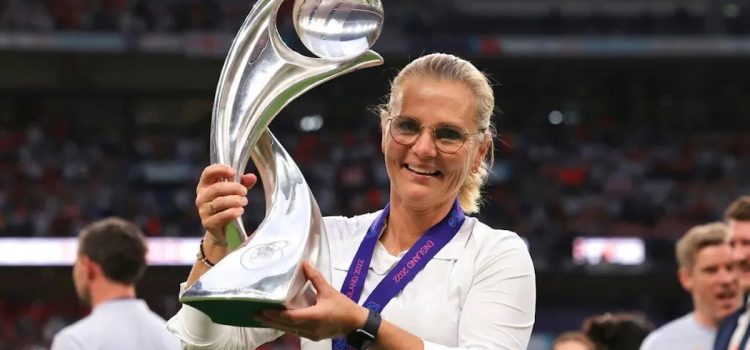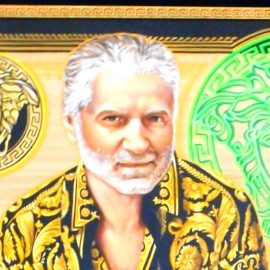
What does it take to transform from a young girl defying gender norms to become one of soccer’s most influential coaches? How can determination and resilience shape not just a career, but an entire sport?
Sarina Wiegman’s career journey—from cutting her hair short to play soccer with boys to leading national teams to victory—is chronicled in her book What It Takes. Her story reveals the challenges and triumphs of breaking barriers in women’s soccer and offers insights into effective leadership and cultural change.
Keep reading to discover how one woman’s passion changed the landscape of international soccer forever.
Image credit: Free Malaysia Today
Sarina Wiegman’s Background & Early Career
Sarina Wiegman’s career has advanced women’s soccer, and her journey began in an era of significant gender barriers. Her diverse experiences as both competitor and mentor in soccer—a sport predominantly governed by men—shaped her path from managing the Netherlands’ national squad to leading the English team to victory.
From her earliest years, she confronted societal norms and biases that threatened to dampen her passion for soccer. At age six, when she started playing, women’s football had yet to be acknowledged by the Royal Dutch Football Association, and girls had no opportunities to join clubs. Demonstrating the determination that would characterize her career, Wiegman cut her hair short to appear more like her male counterparts. She faced persistent criticism for participating in what was traditionally considered a male domain.
This early determination to overcome challenges foreshadowed her later dedication to promoting gender parity in soccer. These experiences significantly influenced her mentorship style, emphasizing her commitment to creating an environment where young girls can fully participate in the sport they love.
Professional Development & Transition to Coaching
Wiegman’s understanding of the game deepened through her experience in both defensive and midfield roles. Her grasp of spatial tactics, crucial for effective coaching, was particularly influenced by Louis van Gaal’s tenure with the Netherlands men’s national team. After earning her physical education degree, she advanced professionally by taking on mentorship roles at prestigious clubs while maintaining her position as a physical education teacher.
During this period, she earned the necessary credentials to instruct at Europe’s highest tier of soccer and began her tenure with the Netherlands’ national squad, eventually ascending to the role of head coach in 2017. Throughout her coaching career, she has maintained a strong emphasis on nurturing player development and promoting team cohesion.
Wiegman believes that victory arises from nurturing the distinct talents of each player while fostering an environment that encourages teamwork. She consistently underscores the significance of recognizing each player’s unique talents and potential growth areas, focusing on individuality while striving for common goals.
Shortform Notes
- Early gender barriers in sports significantly influenced future coaching approaches and advocacy.
- The transition from player to coach provided unique insights into both perspectives.
- Educational background in physical education strengthened technical understanding.
- Playing multiple positions enhanced tactical comprehension.
- The gradual progression through various roles built comprehensive expertise.
- Understanding spatial tactics from different positions proved crucial for coaching.
- Early experiences with discrimination shaped her commitment to equality in sports.
- The combination of playing experience and formal education created a strong foundation.
- Her methodical advancement through various roles established credibility.
Shortform Tips
- Encourage young girls to play football by volunteering to coach or assist with youth teams.
- Experiment with stepping into traditionally gender-restricted roles to break down stereotypes.
- Use video games that simulate sports to experiment with different positions and understand strategic elements.
- Start observing and analyzing public spaces to understand how people move and interact.
- Create a blog or vlog series sharing insights about physical education and mentorship.
- Map out a personal development plan mirroring the progression of a coaching career.
- Organize informal team gatherings to build relationships.
- Implement a ‘teamwork challenge’ in your family or friend group.
- Engage in role-swapping exercises to appreciate individuality and foster empathy.
Sarina Wiegman’s Leadership Journey
Wiegman’s path from leading the Netherlands national team to taking charge of the English squad demonstrates her exceptional ability to adapt and succeed in different cultural contexts while maintaining her core leadership principles. This journey, marked by significant victories and strategic challenges, showcases her skill in managing the complex responsibilities of national team coaching. From her groundbreaking success with the Dutch team to her transformation of the English squad, Wiegman’s leadership journey illustrates how effective management strategies can transcend cultural boundaries when grounded in clear vision, strong communication, and genuine understanding of team dynamics.
Netherlands National Team Success
Wiegman’s tenure with the Netherlands team demonstrated her exceptional ability to transform a national squad. Under her leadership, the Dutch team achieved their inaugural victory at the 2017 European Championship. Her tactical acumen became particularly evident in crucial matches, such as the game against Japan where her halftime adjustments led to a comeback 2-1 victory. She implemented strategic changes that responded to specific game situations while building a cohesive team culture that valued every player’s contribution. Through innovative training methods and adaptable systems, she enhanced the team’s ability to respond effectively to different opponents’ playing styles.
Transition to English Team
After her success with the Netherlands, Wiegman took on the challenge of leading the English national team, demonstrating her ability to adapt her leadership approach to a new cultural context. She immersed herself in understanding and respecting English football culture and traditions, carefully adapting her communication style to match English team dynamics. Through detailed discussions with coaching staff and players, she gained deep insight into team perspectives and existing strengths. She built trust through consistent and culturally appropriate leadership methods, taking time to understand the nuances of English football before implementing new systems.
Managing High-Pressure Situations
Wiegman’s ability to remain calm under pressure proved crucial for keeping her team focused on immediate goals. She maintained consistent routines during high-stakes tournaments while developing structured approaches to decision-making in crucial moments. Her comprehensive preparation strategies for major competitions included supporting players’ mental and emotional well-being during intense periods. She developed clear protocols for handling media pressure and external expectations, ensuring that the team could maintain focus on their performance objectives regardless of outside influences.
Building Support Systems
Wiegman recognized that successful team performance requires robust support structures. She assembled a diverse coaching staff with complementary expertise and incorporated sports psychology professionals to support mental preparation. By establishing clear roles and responsibilities within the support team, she created an efficient system that could respond quickly to team needs. Regular feedback channels allowed for continuous adjustment of support strategies, while comprehensive recovery and wellness programs helped maintain peak performance throughout demanding tournament schedules.
Shortform Notes
- Cultural adaptation is crucial when leading teams from different nations.
- Success in one context doesn’t guarantee success in another without proper adjustments.
- High-stakes situations require both tactical and psychological preparation.
- Support systems must be comprehensive and adaptable to changing team needs.
- Media management becomes increasingly important at higher competitive levels.
- Team cohesion requires consistent nurturing during transitional periods.
- Leadership credibility depends on demonstrating cultural understanding.
- Pressure management strategies must be tailored to individual player needs.
- Support staff coordination directly impacts team performance outcomes.
Shortform Tips
- Study the cultural context thoroughly before taking on leadership roles in new environments.
- Develop multiple communication styles to effectively reach diverse team members.
- Create structured routines for high-pressure situations.
- Build relationships with support staff before implementing new systems.
- Document successful pressure management strategies for future reference.
- Establish clear communication channels between all support team members.
- Regular team feedback sessions help identify areas needing additional support.
2023 World Cup Campaign
The 2023 Women’s World Cup campaign represented both the culmination of Wiegman’s careful preparation and a test of her team’s resilience under unprecedented pressure. This tournament challenged the England squad with extensive travel demands, intense competition, and the weight of national expectations. Through each stage of the competition, from the comprehensive preparation phase through to the final match against Spain, Wiegman’s leadership abilities and tactical acumen were put to the test, revealing both the strengths of her methodology and the areas where future growth remained possible.
Sarina Wiegman’s Legacy & Impact
Sarina Wiegman’s influence on women’s soccer extends far beyond her win-loss record or tactical innovations. Her career represents a transformative force in the sport, breaking down gender barriers, establishing new standards for coaching excellence, and creating pathways for future generations of women in football. Through her dual focus on achieving immediate success while building sustainable structures for the future, Wiegman has helped reshape the landscape of women’s soccer, influencing everything from grassroots development to institutional policy-making. Her impact serves as both inspiration and practical blueprint for advancing women’s participation and leadership in sports.
Advancing Women’s Soccer
Wiegman’s unwavering dedication to the development of every team member’s abilities has been a pivotal element in her string of successes. As a mentor, she consistently sought new perspectives, challenged traditional thinking, and embraced novel methods in various aspects of team preparation. Her meticulous approach is evident in her thorough examination of various strategic situations, her openness to innovative coaching methods, and her dedication to preserving the psychological health of her team.
Her commitment to advancing the status of women’s soccer extends far beyond the boundaries of the sport itself. The 2023 World Cup, she believes, significantly enhanced the international stature of women’s soccer, marking a crucial step toward establishing greater parity in athletics. Her drive and achievements have inspired not just players and mentors but also executives in football institutions to invest in and enhance infrastructure, thereby raising the global stature of women’s football.
Creating Inclusive Environments
Wiegman firmly believes that a team’s resilience is enhanced by its diversity. Throughout her coaching career, she has consistently worked to create an environment that embraces diverse perspectives, cultural heritages, and individual backgrounds, cultivating a culture that highly regards diversity and inclusion. She acknowledges the historical scarcity of female representation in the football industry and serves as a fervent advocate for expanding women’s involvement across multiple facets of soccer, including participation as players, roles in coaching, and significant positions within the governance and administration of soccer entities and clubs.
Building Future Leadership
Wiegman’s dedication to forging paths for women’s involvement in football encompasses all aspects of the sport. Her commitment to creating a welcoming atmosphere requires more than just talk; she demonstrates this through initiating significant changes. Her role as a mentor to emerging female athletes and her unwavering encouragement of their participation in sports continues to shape the future of women’s soccer.
She fosters a team environment where open communication and collaborative problem-solving are paramount, ensuring every individual feels appreciated and possesses essential support. By building safe spaces where everyone feels comfortable voicing their concerns, she creates opportunities to address issues of inclusivity and make positive changes both within the team and beyond. Wiegman underscores that success in creating an inclusive culture requires unwavering commitment and continuous efforts, courageously confronting challenging truths and scrutinizing conventional norms.
Shortform Notes
- Institutional change requires both advocacy and demonstrated success.
- Mentorship plays a crucial role in advancing opportunities for women in sports.
- Sustainable progress depends on systemic changes, not just individual achievements.
- Diversity in leadership positions enriches decision-making and perspective.
- Cultural change requires consistent effort over extended periods.
- Infrastructure improvements need both financial investment and policy support.
- Inclusive environments must be actively maintained, not just initially created.
- Leadership development requires both formal and informal support structures.
- Progress in women’s sports affects broader gender equality issues.
- Resistance to change often comes from established institutional structures.
- Success at high levels can create meaningful change in grassroots opportunities.
- Media representation plays a crucial role in advancing women’s sports.
Shortform Tips
- Share women’s sports achievements through social media and personal networks.
- Volunteer for programs that promote gender equality in sports.
- Create mentorship opportunities for aspiring female athletes and coaches.
- Start conversations about the achievements of female athletes in everyday discussions.
- Challenge gender stereotypes in sports through active participation and advocacy.
- Support women’s sports by attending games and following teams.
- Implement inclusive practices in your own team or organization.
- Create a “Kudos Board” to recognize diverse contributions and achievements.
- Foster peer-to-peer support networks for women in sports leadership roles.
- Document and share success stories of women in sports leadership positions.
- Organize workshops and seminars focused on women’s leadership in sports.
- Develop resource guides for aspiring female coaches and administrators.






